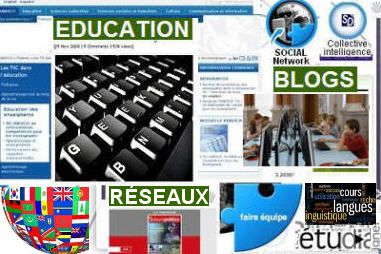Dossier Blogs Réseaux Education
7 Novembre 2012 , Rédigé par frul8 Publié dans #Nouvelles

Espace d' actualisation des ressources, bibliographies et documentation
du DOSSIER
Blogs Réseaux Education - Apprentissage Langues
http://flecampus.ning.com/profiles/blogs/blogs-education

Le blog comme site pédagogique
Podcasting / Réseaux Audio et Vidéo
1. Blog de l'enseignant
2. Blogs / Réseaux des étudiants
3. Blog / Réseau de la classe
Types d'activités dans les blogs
RESEAUX - PROJETS
-
-
-
-
-
-
-
VIDEOS
-
-
Blog Campus FLE
Historique Archives
Audio Campus FLE
Etudiants Campus
Podomatic Audioblogs
Apostrophes - B.Pivot
Assistas Lecteurs à l'étranger
Auto-défense intellectuelle
Choisir Manuel Classe FLE
Cinéma - Films avec sous-titres
Compréhension orale Ressources
Compétences Langues Etudiants
Cours et Conférences en ligne
Conférences, Colloques, Revues
Corpus Dictionnaires Prononciation
Découvertes et Web Navigations
Difficultés et Fautes Prononciation
Education Internet et TICE
Enregistrer Voix en ligne
Espace Pédagogique FLE
Evenements Médias Audiovisuels
Jeux vidéo Logiciels 3D classe
Lectrices Sensibilisation Orale
Livres bilinguesTextes Podcasts
Podcasts Baladodiffusion Langues
Podcasting Langues Social Media
Professeurs FLE Métiers Langues
Prononciation Recherches Méthodes
Historique Premiers Podcasts Campus
Projets télécollaboration Langues
Production Orale Recherches Projets
Séquences Pédagogiques Multimédia
Compétences Langues Enseignants
Théâtre et Apprentissage Langues
Echauffement Vocal et Prononciation
Tutorat et tâches Production Orale
Corneille
Daudet
Desnos
Duras
Fénelon
Flaubert
Gautier
Genet
Gide
Giono
Giraudoux
Goncourt
Hugo
Ionesco
Jarry
Labé
La Bruyère
La Fontaine
Laclos
Lautréamont
Le Clézio
Malherbe
Mallarmé
Malraux
Perrault
Perse
Prévert
Proust
Queneau
Rabelais
Racine
Rimbaud
Robbe-Grillet
Romantisme
Ronsard
Rousseau
Valéry
Verlaine
Jules Verne
Boris Vian
Villon
Voltaire
Yourcenar
Zola
XXème Siècle
XXIème Siècle
Céline
Cendrars
Char
Claudel
Cocteau
Eluard
A.Fournier
A.France
Gainsbourg
Gary
Glissant
Gracq
Green
Houellebecq
Haldas
Le Clézio
Loti
Maalouf
Makine
Mauriac
Merle
Michaux
Modiano
Montherlant
Nothomb
Obaldia
Ollier
Péguy
Pennac
Perec
Ponge
Pinget
Queffélec
Réda
PJ.Rémy
Ramuz
Rinaldi
Rouart
Sabatier
Sagan
Sarraute
Semprun
S.Senghor
Sollers
Supervielle
Troyat
Newsletter
Abonnez-vous pour être averti des nouveaux articles publiés.
Pages
Catégories
- 36 Nouvelles
- 27 FLE
- 12 Blogs et enseignement
- 10 Campus Virtuel FLE
- 5 Audio Blog
- 5 Outils
- 4 Bibliographies
- 1 Education
- 1 Langues
- 1 Phonétique
- 1 Podcasting
- 1 Prononciation
- 1 cmc
- 1 mfl
- 1 oie
Archives
NETWORKS
TÉLÉCOLLABORATION
Projets interuniversitairesECHANGES LANGUES
Forums et Listes en français
Chats en françaisForum vocal - Echanger en français
Communication en temps réel:Chat IRC Vidéoconférence -
Enseignement des langues - FLE
Directives, compétences, standards
-
Classification -
GLOSSAIRES - Formation - Internet
-

Le blog comme site pédagogique
Podcasting / Réseaux Audio et Vidéo
1. Blog de l'enseignant
2. Blogs / Réseaux des étudiants
3. Blog / Réseau de la classe
Types d'activités dans les blogs
Hébergeurs
Bibliographies
Blogs et Réseaux:
noveaux média
Audio - Vidéo Blogs
-
-
PROJET - ECHANGES LEÓN - LILLE
PROJET INTERNATIONAL EUROPAUL
-
Documents sonores: textes audio
Bibliothèques
Musées
Géographie
Histoire
Civilisation
Radio -Télévision
Tourisme
Cinéma
Journaux / Revues
Audioblogs
Présentation étudiants
Présentation Ville /Région
Découvertes culturelles
Comprensión Orale
Production Orale
Analyse / Recherche
Comprensión Orale
Production Orale
Découvertes culturelles
Questionnaires TIC
GRILLES
Grilles Tâches
Grilles Blogs Educatifs
Grilles Podcasts Educatifs
Grilles Réseaux Educatifs
Les consonnes - Agrega ITE
Les voyelles - Edu385Cat
Séquences Grammaire
Séquences Vocabulaire
Niveau débutant
Niveau Moyen
Niveau Avancé
Portail Dictées FLE
-
Vins de France
Météo, Mois, Saisons
Films français
Jeux Multimédia
Régions de France
Dictées Multimédia
Chansons Karaokés
Nationalités et Pays
300 mots plus utilisés
Musées: Art et Culture
Automobile AudioVisuel
Dictionnaires AUDIO
Cours Audiovisuels
Nature et animaux
Articles
Démonstratifs
Dictées
Interrogatifs
Nom
Numéraux
Possessifs
Prépositions
Pronoms
P. personnels
P. relatifs
Théories
Verbes
COURS, CONFÉRENCES ET ATELIERS
STAGES FORMATION / COLLABORATION
-
-
-
-
-
-
-
-

/image%2F0553950%2F20141106%2Fob_b101fa_mosaictwiter.jpg)


/idata%2F0023298%2Fimag_microTIC.jpg)
/idata%2F0023298%2FIMAGprononciationnnn.jpg)
/idata%2F0023298%2F%2FUStreamEtu2009.jpg)
/idata%2F0023298%2FIMAG_RLanguesJuin11.jpg)
